At the bottom of the video… select “English” in the subtitle bar. The ‘title’ on the screen reads: Eliecer Ávila makes a fool of Ricardo Alarcón
This event is from 2012.
English Translations of Cubans Writing From the Island
At the bottom of the video… select “English” in the subtitle bar. The ‘title’ on the screen reads: Eliecer Ávila makes a fool of Ricardo Alarcón
This event is from 2012.

![]() 14ymedio, Havana, 6 October 2023 — Luis Robles Elizastigui, known as “the young man with the placard,” has been imprisoned since December 2020 in the Combinado del Este prison, in Havana, and has not yet received the change to a minimum security regime in the La Lima camp, in Guanabacoa, as the authorities promised at the end of August.
14ymedio, Havana, 6 October 2023 — Luis Robles Elizastigui, known as “the young man with the placard,” has been imprisoned since December 2020 in the Combinado del Este prison, in Havana, and has not yet received the change to a minimum security regime in the La Lima camp, in Guanabacoa, as the authorities promised at the end of August.
In a publication on social networks, Robles’ mother, Yindra Elizastigui, said that in conversations with the young man he regretted the delay. “He tells me that he is happy when he sees or finds out that they have taken someone to the camp, but that he still cannot explain why they have delayed his transfer,” she says.
The woman also denounced the injustice committed against Robles as part of “psychological torture” towards her family. “I have also suffered and continue to suffer from the unjust imprisonment to which my son Luis is subjected,” said Elizastigui who, after suffering memory loss as a result of a temporary ischemia, fears that by the time her son is released she will no longer be able to recognize him.
In addition, the young man has a son, she explained, whose mother is also imprisoned, although not for political reasons. “His son needs him now more than ever (…) and it is something that should be taken into account.” continue reading
Last August, when Elizastigui told this newspaper about the change of regime for Robles, she warned that the measure had only been approved then by the authorities of the Combinado del Este and confirmation from other entities such as State Security was still required.
“I, as a mother, hope that they approve his transfer, because Luis is in there because of them, whose conscience imprisoned him. What he [Robles] did is his right, which is in the Constitution. His imprisonment is unjust,” said Elizastigui.
The political prisoner’s mother, who hoped that her son’s process would progress at a good pace until he was granted parole, also mentioned that the young man was suffering from health problems. “We must take into account his health (…), which has worsened due to the injustices that have been committed.”
“He has had good behavior, and this has been reported to me by the prison authorities themselves and by Gerardo, the Security agent assigned to him. So let’s hope that [the measure] is complied with,” the woman then insisted. She had pinned her hopes on her son’s good behavior to earn him a quick exit from the prison to La Lima.
____________
COLLABORATE WITH OUR WORK: The 14ymedio team is committed to practicing serious journalism that reflects Cuba’s reality in all its depth. Thank you for joining us on this long journey. We invite you to continue supporting us by becoming a member of 14ymedio now. Together we can continue transforming journalism in Cuba.

![]() 14ymedio, Havana, 7 September 2023 — Cuban volleyball player Ellemay Santa Miranda left the national team in Quebec, Canada, after losing the bronze medal in the Norceca Continental tournament, which ended last Sunday.
14ymedio, Havana, 7 September 2023 — Cuban volleyball player Ellemay Santa Miranda left the national team in Quebec, Canada, after losing the bronze medal in the Norceca Continental tournament, which ended last Sunday.
The news was given by the specialized site CubanSp1ke. “We respect your decision and wish you good luck in this new adventure,” was the comment on their social networks. They also said that it is very “difficult” for liberos (receivers), Santa Miranda’s position, to get contracts abroad.
According to Radio Habana, the Cuban Volleyball Federation (FCV) has secured 51 contracts with 14 clubs abroad for players, 21 of them for women. Among the agreements are those of Dezirett Madam and Ailama Cesé with teams from the Italian League. Manager Osvaldo Martínez said that the important thing is that this international contact will benefit the sports growth of Cubans.
The volleyball player was the most outstanding player of the national team and during the Pan American Cup that was held in Santo Domingo was designated the best receiver
The volleyball player was the most outstanding player of the national team, and during the Pan American Cup Final Six of Norceca, which was held in Santo Domingo, Dominican Republic, was designated the best receiver. continue reading
The departure of Santa Miranda comes a month after the National Volleyball Commission dismissed the coach, Nicolás Vives Coffigny, at the request of the players, according to the official press. Those changes also included the removal of the women’s team coach, Tomás Fernández Arteaga.
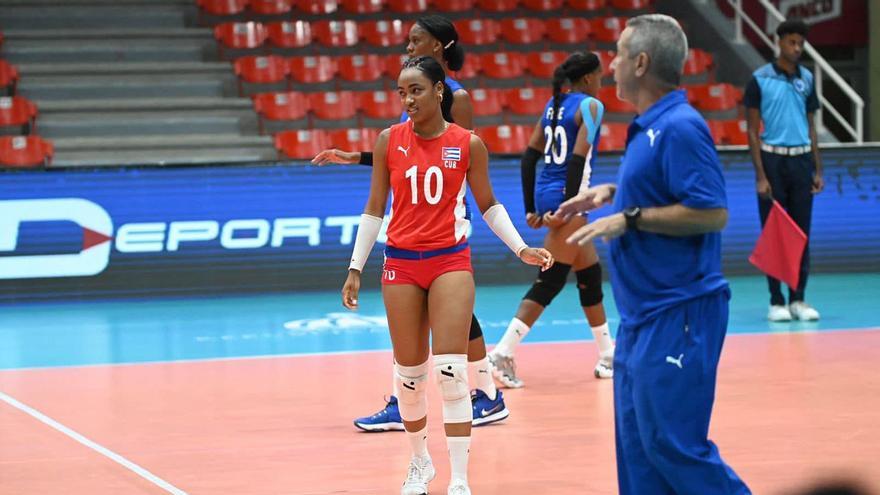
The arrival of Leivys García as the technical director of the Cuban team did not seem to convince Ellemay Santa Miranda, who in the last match of the tournament in Quebec against Canada was absent and did not manage to contribute any points to the scoreboard for the Island’s team.
Santa Miranda participated in the Under-20 World Championship held in 2019 in Mexico, and she also joined the team for the Central American and Caribbean Games in San Salvador.
Currently, the women’s volleyball team is ranked number 24 in the world ranking of this sport, and is in crisis. Its most recent achievements are the three gold medals won consecutively in Sydney (2000), Atlanta (1996) and Barcelona (1992).
Translated by Regina Anavy
____________
COLLABORATE WITH OUR WORK: The 14ymedio team is committed to practicing serious journalism that reflects Cuba’s reality in all its depth. Thank you for joining us on this long journey. We invite you to continue supporting us by becoming a member of 14ymedio now. Together we can continue transforming journalism in Cuba.
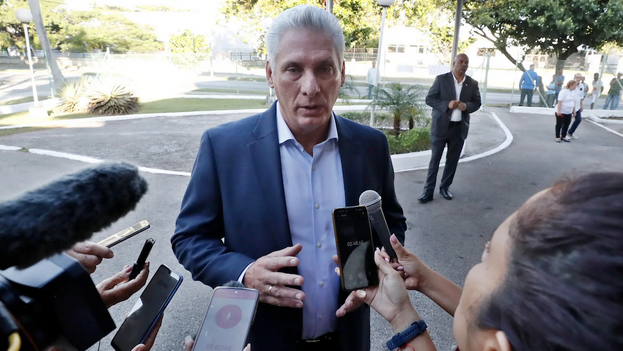
![]() 14ymedio, Yoani Sánchez, Havana, 23 January 2023 — In recent years, Cuban President Miguel Díaz-Canel has experienced that diplomatic solitude that often surrounds the authoritarians. Except for a recent tour of Russia, Turkey, Algeria and China, in addition to the favors that the Mexican president, Andrés Manuel López Obrador, has given him in public, the 62-year-old engineer has seen how his condition as president not chosen through votes at the polls, and the the repression that he unleashed against the protesters of July 11, 2021 has taken a political toll on him and left him excluded him from red carpets and international events.
14ymedio, Yoani Sánchez, Havana, 23 January 2023 — In recent years, Cuban President Miguel Díaz-Canel has experienced that diplomatic solitude that often surrounds the authoritarians. Except for a recent tour of Russia, Turkey, Algeria and China, in addition to the favors that the Mexican president, Andrés Manuel López Obrador, has given him in public, the 62-year-old engineer has seen how his condition as president not chosen through votes at the polls, and the the repression that he unleashed against the protesters of July 11, 2021 has taken a political toll on him and left him excluded him from red carpets and international events.
His arrival this Monday in Argentina, to attend the summit of the Community of Latin American and Caribbean States (Celac) seeks to bring him out of that loneliness and try to insert him into the Latin American scene. But the Díaz-Canel who arrives in Buenos Aires is a failed president in all respects: with a country experiencing the largest mass exodus in its history, inflation that has plunged millions of Cubans into poverty, and facing a political crisis it only knows how to react to through threats and the imprisonment of its opponents.
Unlike other guests, the Cuban leader has nothing to offer a regional organization that has been in the doldrums for years and in which the citizens of the continent less and less place their hopes. He arrives at the meeting, moreover, after strengthening his alliance with Vladimir Putin’s Russia and accepting the creation of an Economic Transformation Center that, from Moscow, will supervise the Cuban drift towards a “private company” model, marked by vices that have turned the Russia itself into a nation of commercial mafias, complicit oligarchs and businessmen that emerged from the bowels of the old KGB.
Díaz-Canel is the Kremlin’s man at this meeting and will have to be vigilant in case any mention is made at the meeting of the war in Ukraine, a conflict that is decisive for the current continental economic situation. Will the Russian invasion be called a “special military operation” as the official Cuban press does, or will there be talk of an invasion? The man whom Raúl Castro seated in the presidential chair in Havana could influence the event’s final documents to soften criticism of Russia and to obviate, Olympically, the conflict.
It will also correspond to Díaz-Canel to close ranks with Venezuela’s Nicolás Maduro and, presumably, with Nicaragua’s Daniel Ortega, others of the unpresentable autocrats summoned to the summit. But we will have to look closely at the Cuban’s meeting with the Chilean president, Gabriel Boric, who has been very critical of the violation of human rights in Nicaragua and Venezuela, although much more lukewarm when it comes to the island. The handshake with Brazil’s Luiz Inácio Lula da Silva should also be closely watched, because the Brazilian leader does not arrive in the same position that he enjoyed in his previous terms, nor does his closeness to the Cuban regime mean the same as it did a decade ago.
Ruined economically and rejected by a large part of Cubans, Miguel Díaz-Canel knows that after the summit closes and the group photo of the leaders is released, he will have to get on the plane and return to the same country, bankrupt and without hopes, that he saw him go. His calculations, more than towards Buenos Aires, are now focused on Moscow, in which a dangerous and feared bear watches over his back. In exchange, he will continue to be the “comrade of the Kremlin” in Latin America, the man who is willing to cede part of Cuban sovereignty to a distant country rather than allow a democratic opening on the island.
________________________
Editor’s Note: This text was originally published in Deutsche Welle in Spanish.
____________
COLLABORATE WITH OUR WORK: The 14ymedio team is committed to practicing serious journalism that reflects Cuba’s reality in all its depth. Thank you for joining us on this long journey. We invite you to continue supporting us by becoming a member of 14ymedio now. Together we can continue transforming journalism in Cuba.
#Cuba #Photographer Javier Caso is interrogated by State Security police in Cuba over his relation w/filmmakers Miguel Coyula/Lynn Cruz-surveilled for their Doc.“Nobody”
👉 For the regime/an #artist is defined by membership in a state institution.#Canada #CubaEsUnaDictadura pic.twitter.com/wZ3ap6Jjw6— Michael Lima Cuadra (@ngotranslations) December 20, 2022
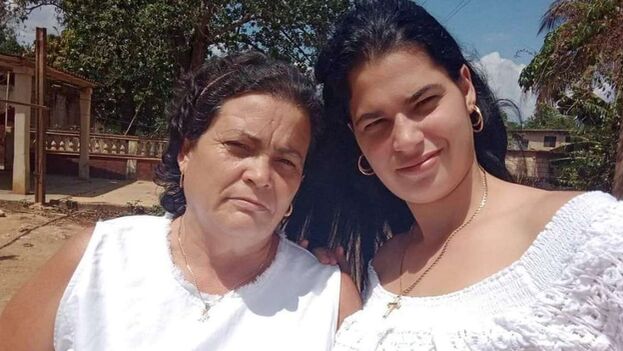
1![]() 4ymedio, Yoani Sánchez, Havana, 14 May 2022 — At the age of 16, Sissi Abascal Zamora was not, like any other teenager, walking with her friends or wearing new clothes. At that age she became part of the Ladies in White Movement and she lived between arrests and police operations. On July 11, 2021, her participation in the popular protests of that day led her to prison with a six-year sentence.
4ymedio, Yoani Sánchez, Havana, 14 May 2022 — At the age of 16, Sissi Abascal Zamora was not, like any other teenager, walking with her friends or wearing new clothes. At that age she became part of the Ladies in White Movement and she lived between arrests and police operations. On July 11, 2021, her participation in the popular protests of that day led her to prison with a six-year sentence.
Her mother, Annia Zamora Carmenate, has no doubts: “Sissi is a political prisoner.” From that quiet girl, who differed from her brothers for being very calm, she became one of the most consistent activists in the province of Matanzas. In the little town of Carlos Rojas, the young woman – on 11J (July 11th) she was 23 years old – starred in an intense demonstration together with dozens of neighbors.
“That day we were at home and I connected to the internet through my cell phone. There I began to see the videos of the demonstrations, first in San Antonio de los Baños and then in Havana, so I told my husband, Armando Abascal Serrano,” about it, Zamora details to 14ymedio. “Then Sissi tells me that people were gathering in the Carlos Rojas park.”
The family lives on the outskirts of the town and when they got out on the road there were already other people waiting for them. “They know that on other occasions we have also protested.” In November 2020, the Abascal family was part of the group of residents of that community, belonging to the Jovellanos municipality, who demonstrated in the streets against the long blackouts.
Since a long time earlier, saying the surname Abascal among the neighbors is like remembering that the first name of the town was Cimarrones, after the slaves who did not accept the stocks or the whip of the foreman and escaped to the surrounding mountains. But these rebels of today are not facing slavers with dogs, but policemen who brandish their tonfas and lock them up in dungeons.
“We kept going and arrived at the park. That was tremendous. Everyone joined in. Right away, two State Security officers appeared and took my husband to the station in front of the park.” The arrest emboldened the protesters. “We were joined by people that we had never seen at other demonstrations we’ve carried out.”
Sissi climbed onto a bench, “suddenly a sheet appeared. We put it on the sidewalk and wrote ‘Patria y Vida’ [Homeland and Life] on it.” She took off her shoelaces and I gave her mine too. With that we tied the fabric to a branch of a flamboyan tree on one side and on the other we tied it to a crutch. We put the sign on a bicycle and started to go around the park.”
That month of July the town of Carlos Rojas, like the whole Island, was experiencing critical days. “In the municipality of Jovellanos there was a very intense outbreak of covid-19, we had no medication, the isolation centers had very poor conditions,” Zamora recalls. The lack of freedoms was combined with the economic crisis and the epidemiological situation. That Sunday patience reached the limit. continue reading
Zamora closes her eyes and seems to be living that day again. “The people gathered in the park and shouted Food! Freedom! Down with the dictatorship! We want medicines,” also “Patria y Vida!, that slogan was the one that was repeated the most, the one that will go down in history: there were old people, children and many young people too.”
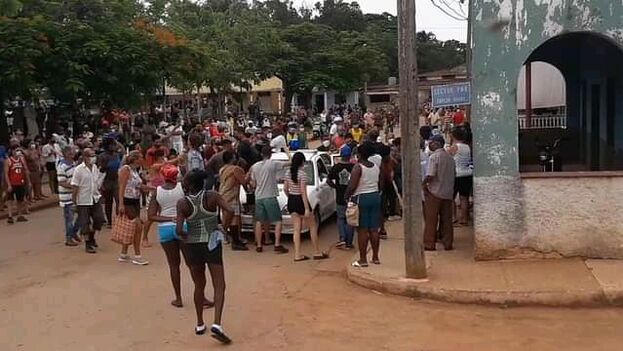
Then the patrol car arrived to transfer Armando Abascal Serrano from the town police station to Jovellanos. “People stood in front of the vehicle to prevent it moving, but the police dealt many blows and finally took him away,” she says. The rest of the afternoon, those who remained continued to repeat slogans until around 6:30 pm when a bus and a truck with shock troops arrived.
“In the bus and the truck were Yonaikis Villegas Oviedo, the mayor of Jovellanos, also the representative of the Communist Party, the director of the Inder (National Institute of Sports, Physical Education and Recreation), members of the political police dressed in civilian clothes, members of the Government, the Party and the head of the Communals,” lists the mother.
“They came with sticks and stones in their hands, later we learned that they were even carrying bottles. It was a very strong aggression. They hit me and I fell against the bicycle that held the sheet, Sissi fell on me.” Zamora adds that the Communal official attacked her in the head, eyes, arms and her belly. “I had just had surgery and I fainted, so I could no longer see my daughters.”
When she came to, she heard someone yelling at her that Lisi, her other daughter, was injured after receiving several bottle blows to the head. The mother ran to the Polyclinic and on the way her shoes came off, the shoes whose laces had helped tie the sign. There she found her daughter, who was having her head bandaged. “She also had one hand with the fingers turned backwards that the orthopedist had to treat to put them back forwards.”
Shortly after, Sissi also arrived at the Polyclinic, having been beaten. Half an hour later the three women were transferred in an ambulance to Jovellanos. “There were many injured there because the police had distributed many blows. They gave my daughter Lisi a certificate of injuries, because they had to give her stitches on the head wound, but they did not want to give Sissi and me anything.”
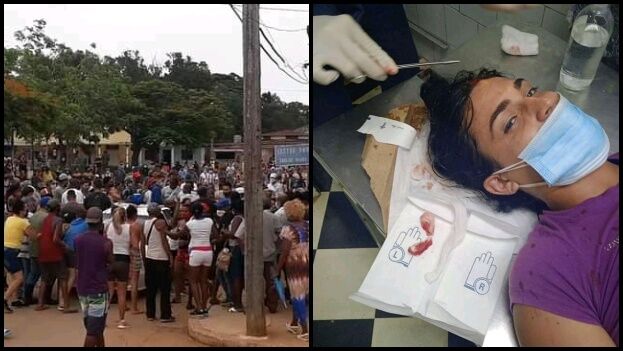
That day they were able to return home and on Tuesday, July 13, they went to the municipal police station to file a complaint for the injuries against Lisi. “Even today, ten months later, neither the police nor the Prosecutor’s Office give details, they always evade,” laments Zamora.
The family patriarch was missing for 14 days. “We took him some clothes to the Jovellanos police station and they stole them, they never gave them to him. He was imprisoned for two months in the Combinado del Sur and then he was fined,” explains the woman. “On September 20 in the morning, an official from the Municipal Court of Jovellanos arrived and she knocked on the door of our house. She had in her hands a prosecutor’s request for a six-year sentence against Sissi.”
The trial took place on November 3. In the trial, they judged not only the young woman, but also Frank Ernesto Trujillo Hervis and Yoendris Torres Corría,ann 11J protesters. “Frank — when my daughter was being beaten — he pulled her out of the group of women. He is now sentenced to six years in prison.”
At the trial in the Municipal Court of Jovellanos, Zamora attended as a witness: “I went in, made my statement and then I could only return to hear the conclusions. It almost gave me a heart attack to hear so many lies. The prosecutor Odilia Casallas García lied blatantly. She said that since 1959 no one had been mistreated and beaten by the police in Cuba.”
Sissi’s sister couldn’t stand that, she got up from her seat and contradicted the Prosecutor. “Our family has been hit many times. I still have stitches on my head from being hit with a bottle.” Immediately the guards took her out of the room.
The mayor of the Ministry of the Interior, Silvia Martínez Montero, accused Sissi of attack and contempt, although the family insists that this officer was not present on Sunday in Carlos Rojas park. “The trial was a farce, a clown show. Not even the defense attorneys could do their job,” Zamora denounces.
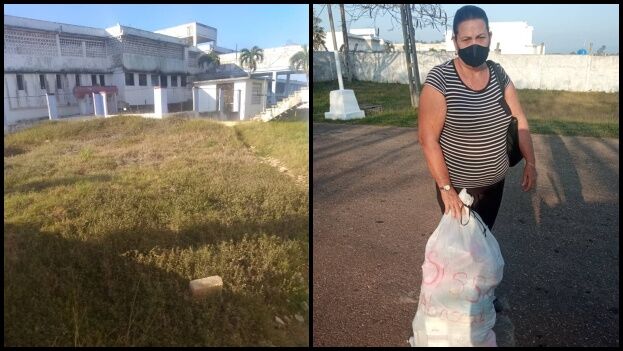
The appeal trial was held on December 27, under an intense security operation, and the sentence of six years in prison was confirmed. The young woman was confined in the Matanzas women’s prison, Labiotec. “It’s a nasty, sad place. It has two buildings and she’s in one of them in cubicle three on the third floor.”
But during the phone calls, the young woman’s great concern is not the prison conditions but her family. To calm her mother, she reiterates: “Don’t worry, remember how many dungeons, beatings and detentions I have experienced.” She also wants to know details of the other prisoners of that historic day of protests.
When Annia Zamora Carmenate asks her daughter what she wants her to bring in the food bag that she tries to prepare for each visit, the young woman asks for little or nothing. Although her mother insists, she responds in monosyllables. In those moments, she returns to being the shy and quiet girl from the town of Carlos Rojas.
____________
COLLABORATE WITH OUR WORK: The 14ymedio team is committed to practicing serious journalism that reflects Cuba’s reality in all its depth. Thank you for joining us on this long journey. We invite you to continue supporting us by becoming a member of 14ymedio now. Together we can continue transforming journalism in Cuba.

![]() 14ymedio, Havana, 5 May 2022 — A bus on the P8 route in Havana burned this morning near the Electric Division of Havana, where it was parked. The news has not yet been released by the official media and the only information available is that shared in the Accidentes buses & camiones Facebook group, where the author of the images, in which the work of the firefighters can be seen putting out the fire, affirms that “an electrical short on the driver’s board” is noted.
14ymedio, Havana, 5 May 2022 — A bus on the P8 route in Havana burned this morning near the Electric Division of Havana, where it was parked. The news has not yet been released by the official media and the only information available is that shared in the Accidentes buses & camiones Facebook group, where the author of the images, in which the work of the firefighters can be seen putting out the fire, affirms that “an electrical short on the driver’s board” is noted.
The users of the group have been scandalized by the fact that there was no fire extinguisher at the bus stop capable of putting out the fire more quickly, although most were surprised by the fact that recently there have been more similar cases. Some comments speak clearly of “sabotage,” although without proof.
In early March, a fire burned up five school buses in Cojímar, East Havana. The event occurred in broad daylight in the area where the buses stopped, four of the Chinese brand Yutong and one Diana brand, in this case. continue reading
“Unable to put out the fire, due to the strong winds at that time, the flames spread, reaching four other buses that were stopped in the area. Work continues on the investigations, to delve into the causes that generated this unfortunate event,” the Automotive Transport business group said in a brief statement.
There were so many speculations at the time that the Ministry of Transportation had to publish a note in which the incident was attributed to an electrical failure that occurred while one of the buses was being repaired.
In September 2020, a bus caught fire in the middle of the street in the El Mónaco neighborhood in Havana, which required the intervention of the Cuban Fire Department to put out the flames, but the vehicle was left completely unusable.
Months before there was another fire, also on a street in Havana, Belascoaín, between Zanja and Salud, due to a “failure” in the engine.
____________
COLLABORATE WITH OUR WORK: The 14ymedio team is committed to practicing serious journalism that reflects Cuba’s reality in all its depth. Thank you for joining us on this long journey. We invite you to continue supporting us by becoming a member of 14ymedio now. Together we can continue transforming journalism in Cuba.
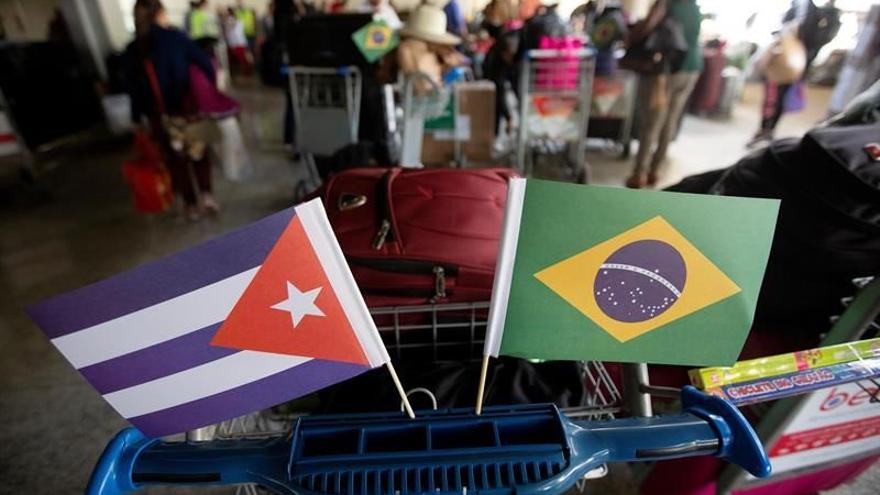
![]() 14ymedio, Madrid, 30 March 2022 — A US appeals court has rejected the appeal of the Pan American Health Organization (PAHO) which tried to paralyze the lawsuit filed by several Cuban doctors against them for facilitating the “human trafficking network” and “slavery” that, they argued, hid the Mais Médicos [More Doctors] program in Brazil. The news was released on Tuesday by the British agency Reuters.
14ymedio, Madrid, 30 March 2022 — A US appeals court has rejected the appeal of the Pan American Health Organization (PAHO) which tried to paralyze the lawsuit filed by several Cuban doctors against them for facilitating the “human trafficking network” and “slavery” that, they argued, hid the Mais Médicos [More Doctors] program in Brazil. The news was released on Tuesday by the British agency Reuters.
The lawsuit was filed in Florida in 2018 by Ramona Matos, Tatiana Carballo, Fidel Cruz and Russela Rivero, four Cuban health workers who denounced the working conditions they experienced as members of the medical cooperation program signed between Raúl Castro and Dilma Rousseff in 2013.
“There is an international organization (PAHO), affiliated with the United Nations, that became the main force to allow Cuba to export its citizens to do slave labor in a foreign country,” said the lawyer for the doctors at the press conference at which the lawsuit was filed.
The complainants consider that PAHO, the American section of the World Health Organization (WHO), violated the Law for the Protection of Victims of Trafficking by being an intermediary of the program, from which it channeled the payments. As is common practice in Cuba’s cooperation agreements, the contracting country, in this case Brazil, sends the money to Havana, which keeps percentages ranging from 70% to 90% of the salary paid for each worker, he explains, and this money goes to support the State.
According to the lawsuit, in the case of Brazil, 85% went to the Cuban government, 10% to doctors, and 5% was retained by PAHO through its mediation. continue reading
The United Nations health organization tried to stop the lawsuit using the immunity granted by US law. The courts considered themselves incompetent to judge an issue that occurred outside the country, but accepted that the claims could proceed from financial activity.
The organization then responded that the complainants were not suiing over the transactions, but rather the foreign conduct, but the courts considered that these movements of money were necessary for the alleged trafficking of persons and could in themselves be the cause of the opening of the judicial process.
PAHO raised more than $75 million through the Mais Medicos program and some $1.3 billion was deposited into Cuban state coffers using US bank accounts, according to the lawsuit documentation.
It is estimated that the Cuban authorities obtained some 11 billion dollars a year thanks to “human trafficking,” according to a study by the Wharton School of the University of Pennsylvania.
The doctors reported in 2018 that they were not informed until they reached their destination of how much they were going to be paid and that the amounts were very meager.
“They were going to give us a thousand dollars, of which 400 was going to be given to us in exchange (in local currency), and 600 dollars was going to go to our account in the Cuban bank,” said one of the plaintiffs, who added some of the general conditions already known, among them the control that the heads of mission exercise over the workers to control any movement, meeting or relations in the destination country.
____________
COLLABORATE WITH OUR WORK: The 14ymedio team is committed to practicing serious journalism that reflects Cuba’s reality in all its depth. Thank you for joining us on this long journey. We invite you to continue supporting us by becoming a member of 14ymedio now. Together we can continue transforming journalism in Cuba.

![]() 14ymedio, Reinaldo Escobar, Havana, 12 January 2022 – When, half a year ago, the first secretary of the Cuban Communist Party said in response to the popular demonstrations against the dictatorship, that the combat order had been given, he was not uttering his worst phrase. No. The worst thing was when he said “They have to go over our dead bodies if they want to confront the Revolution! We are ready for anything, and we will be in the streets fighting!”
14ymedio, Reinaldo Escobar, Havana, 12 January 2022 – When, half a year ago, the first secretary of the Cuban Communist Party said in response to the popular demonstrations against the dictatorship, that the combat order had been given, he was not uttering his worst phrase. No. The worst thing was when he said “They have to go over our dead bodies if they want to confront the Revolution! We are ready for anything, and we will be in the streets fighting!”
People of goodwill may not have imagined that the threat of being willing to do anything would materialize in the disproportionate prison sentences to which more than 200 protesters have been subjected to date.
The disproportion happens, first, through the legal definition of the acts, which converted what should have been classified, at most, as “public disorder” into crimes punishable with greater severity, such as sedition, attack, contempt, instigation to commit a crime and other atrocities. The disproportion also happens because of ignoring the discontent of the people before a State that abuses its prerogatives; the danger in which citizens feel themselves due to the inability of their leaders to guarantee their survival, and, above all, citizens’ belief that they are protected by a right: the right to protest.
It gives the impression that the judges and prosecutors who have tried these protesters have omitted what the Penal Code itself establishes in its Chapter III to define the “exemptions of criminal responsibility,” among them “legitimate defense” is mentioned, as it “state of necessity” and the “exercise of a right.” continue reading
Perhaps they should be reminded of what Magistrate Manuel Urrutia Lleó did on March 14, 1957 when Case 67 was initiated against the young people from Santiago who, on 30 November 1956, took the city of Santiago de Cuba by force of arms to support Fidel Castro’s landing (which ultimately took place on December 2 of that year).
On that occasion, Urrutia said that the young people could not be convicted, because what they had done was protected by the Constitution of 1940, which said that the people had the right to rebel against a dictatorial government. Specifically: “In view of the usurpation and illegal retention of power by Batista and his followers, the defendants acted in accordance with their constitutional rights.”
The 150 accused were not “protesters” but combatants. Led by Frank País and wearing the olive-green uniform, they took to the streets wearing an armband with the flag of the July 26 Movement. Armed as they were, they attacked the Maritime Police station and another police station in the city center.
In the same case, there were 22 expedition members from the yacht Granma, who confessed to having landed in Cuba under the direction of Fidel Castro, to fight to overthrow the dictatorship of Fulgencio Batista and transform the economic, political and social order of the country.
On May 8, 1957, in the eleventh session of the Santiago de Cuba Emergency Court for Case 67 of 1956, the Prosecutor Francisco Mendieta Hechevarría stated that the confession of the accused “constitutes proof that they have acted out of love for the country and to give it a government that makes it happy and free from the anguish that it is experiencing.” A week later, Frank País, along with other detainees, left Boniato prison acquitted for lack of evidence.
There is the right to wonder if in today’s Cuba there are no longer judges and prosecutors like those. And also, with the forgiveness of those who are offended by the comparison: is Luis Manuel Otero Alcántara more dangerous today than Frank País was at the time?
All the historical data mentioned in this text have been taken from Lucharemos Hasta el Final (We Shall Fight to the End), 1957, a volume edited by the Office of Historical Affairs of the Council of State of Cuba.
____________
COLLABORATE WITH OUR WORK: The 14ymedio team is committed to practicing serious journalism that reflects Cuba’s reality in all its depth. Thank you for joining us on this long journey. We invite you to continue supporting us by becoming a member of 14ymedio now. Together we can continue transforming journalism in Cuba.
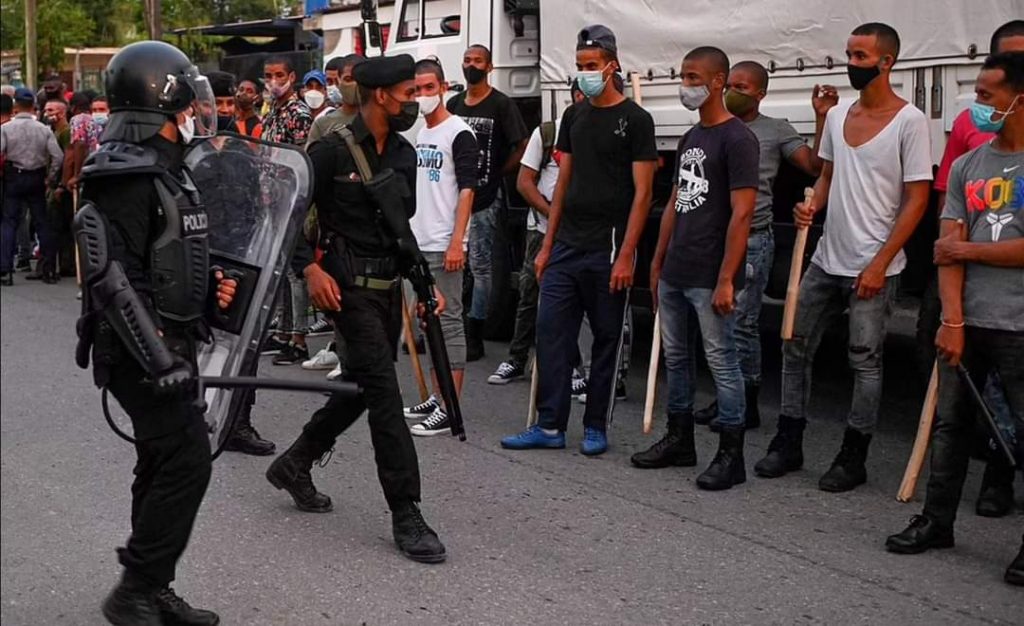
A sortable and continually updated list of those detained and disappeared in the July protests in Cuba, can be accessed here.
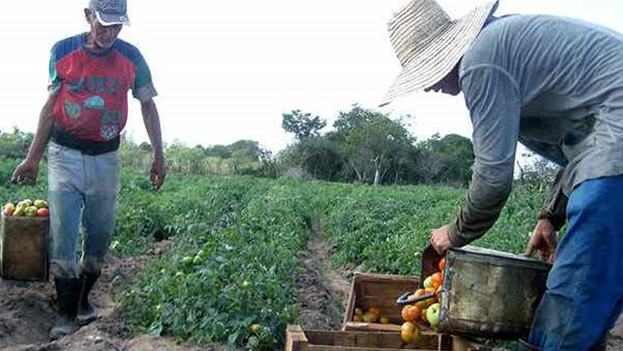
![]() 14ymedio, Havana, 8 April 2021 — Yamile Bombino, an agricultural producer from the municipality of Cabaiguán, in Sancti Spíritus, opted to denounce the incompetence of the state-owned Acopio on April 3. The Sancti Spritus woman has a contract for the delivery of 400 quintals (1 quintal = approx. 100 pounds) of tomatoes with the company, but the harvest is spoiling in the field due to the failures of the State.
14ymedio, Havana, 8 April 2021 — Yamile Bombino, an agricultural producer from the municipality of Cabaiguán, in Sancti Spíritus, opted to denounce the incompetence of the state-owned Acopio on April 3. The Sancti Spritus woman has a contract for the delivery of 400 quintals (1 quintal = approx. 100 pounds) of tomatoes with the company, but the harvest is spoiling in the field due to the failures of the State.
“Two weeks ago the two presidents of the cooperatives were notified of the [tomato] harvests,” she wrote on her Facebook profile and the post quickly went viral. Bombino added that currently Acopio has not sought a solution for the fate of the tomatoes. “It is not fair that this quantity of good quality is lost given the need for food that the country is going through and also with the efforts we have had to make to be able to harvest the crop.”
Two days after the first publication on her social network, Bombino said that she had called Acopio again, this time the provincial company, and only received the answer that “tomatoes are a national matter… Please respect the contract and meet it,” demanded the producer. continue reading
The deficiencies in the collection and distribution of agricultural products are not new, but the Government maintains its position of continuing to centralize the work and production of the farmers. A recent meeting of the National Association of Small Farmers (ANAP) of Sancti Spíritus province once again highlighted these problems.
“Today we have products in the fields such as tomatoes and squash that cannot be harvested because there is no fuel,” the president of the provincial ANAP, Pedro Águila, acknowledged at the meeting, quoted this Wednesday by the local newspaper Escambray. This official was blunt: “The resources have not reached the farmers.”
It is not surprising then, that in the face of this scenario that is repeated in other provinces, some 29 Sancti Spiritus cooperatives report economic losses at the end of the first quarter of the year, while more than 140 have presented “cracks” in finances and productive operations, according to the local newspaper.
After a new change in the tariffs for the commercialization of the crops announced by the Government at the end of March, Esteban Ajete Abascal, president of the League of Independent Cuban Farmers, warned that the authorities “are turning around all the situations to not do what they really should: give freedom and decentralize to satisfy the needs of the farmers.”
Meanwhile, complaints from producers are increasingly common. Last month, Héctor González, a worker at the Pedro y Bienvenido Cooperative, in the Minas municipality, in Pinar del Río, lost a cabbage harvest. The state company Acopio, in charge of receiving the harvest, said it had no workforce to process it.
According to the complaint published on Facebook by the user Anadeilys González, the Cuban farmers lost 1,300 cabbages, after Acopio, in the popular council of Sumidero, rejected the merchandise. As a result of the post, several people commented on similar experiences on the island with papayas, sweet potatoes and yuccas.
“The same thing happened to my cousin with some melons in Holguín and Acopio’s response was that they did not have transportation, but the farmers are not allowed to sell them on their own. Conclusion: The harvest was spoiled,” wrote Elizabeth Batista.
Due to these problems with the destination of the crops and in the midst of a great shortage of inputs, many products that farmers need to work the land will now have to be paid for in freely convertible currency, as is the case of agricultural fertilizers .
Last November, to try to alleviate the severe food crisis in which the island is plunged, the Council of Ministers announced provisions that seemed to announce a slight relaxation in the countryside. Among them, that private farmers could sell part of their production on their own, as long as they first meet with the deliveries agreed with Acopio, something that was looked at skeptically by independent farmers.
“The goals that Acopio sets for us to sell to the State are high and the prices are low,” Rolando Villegas, a farmer from the Guane area in Pinar del Río , told this newspaper at the time. “Many times we have more losses than gains to meet those amounts. The little that remains after meeting the standards, often goes to the feed our own families.”
____________
COLLABORATE WITH OUR WORK: The 14ymedio team is committed to practicing serious journalism that reflects Cuba’s reality in all its depth. Thank you for joining us on this long journey. We invite you to continue supporting us by becoming a member of 14ymedio now. Together we can continue transforming journalism in Cuba.
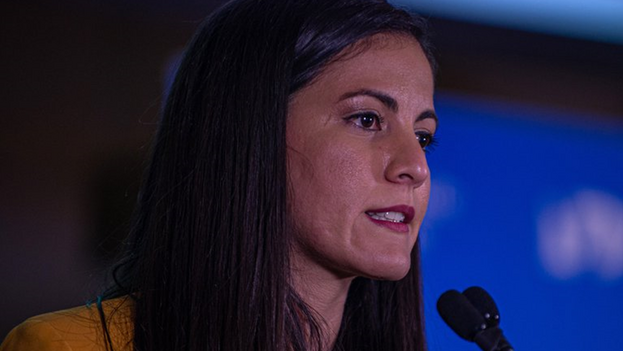
![]() EFE/14ymedio, Miami, 12 February 2021 — On Friday, Cuban exiles and opposition groups in Cuba urged United States president Joe Biden and the US Congress that the review of the policy towards Cuba should be based on democratic change without “unilateral concessions” to the government of President Miguel Díaz-Canel.
EFE/14ymedio, Miami, 12 February 2021 — On Friday, Cuban exiles and opposition groups in Cuba urged United States president Joe Biden and the US Congress that the review of the policy towards Cuba should be based on democratic change without “unilateral concessions” to the government of President Miguel Díaz-Canel.
For several weeks, Cubans “committed to democracy” drew up a plan with 162 proposals that they sent this Friday to the White House, the State Department, and Congress, according to Rosa María Payá, from Cuba Decides, speaking to Efe.
The activist also rejected “aggressive” requests made by the Cuban government and other actors on the Island to the new US Administration of Democrat Biden. continue reading
Payá expressly rejected the removal of sanctions against the financial corporation Fincimex, linked to the Armed Forces
Among them the recent one by a group of Cubans and Americans, such as Alan Gross, who asked Biden to resume the rapprochement with Cuba promoted by President Barack Obama (2009-2017) and to withdraw the sanctions on Cuba toughened by his successor, Republican Donald Trump.
Gross was released in 2014 after five years in prison in Cuba for bringing telecommunications equipment into the country.
Payá expressly rejected the removal of sanctions against the financial corporation Fincimex, which is linked to Cuba’s Armed Forces and handles remittances received from the United States.
She added that they are in favor of “direct” remittances, without the intervention of the Cuban government.
Payá stressed that “it is only up to Cubans to define and decide the destiny of our nation.”
For Cubans who contributed ideas, among them the Ladies in White, the Cuban Republican Party and many other civil groups, the new policy towards Cuba “must be in support of democracy and free and plural elections, without making unilateral concessions, but conditional on irreversible steps towards the recognition of human rights.”
With Biden’s arrival at the White House, politicians and groups of Cuban exiles have asked him not to repeat the mistakes made by the last two administrations, including that of President Obama, which promoted rapprochement with Cuba and in whose administration Biden served as Vice-President.
With Biden’s arrival at the White House, politicians and groups of Cuban exiles have asked him not to repeat the mistakes made by the last two administrations
The proposals were published this Friday by the Pasos de Cambio [Steps of Change] platform, which include the impressions of Cuban opposition organizations and civil society, as well as citizens living on the Island and in the diaspora.
They all agree that “any eventual negotiation process involving the current Cuban regime must recognize the members of the opposition and civil society as interlocutors.”
They point out that, to this end, the regime must first comply with the unconditional release of all political prisoners in Cuba and end all violence and repression.
Similarly, organizations such as the National Human Rights Foundation and the Opposition Movement for a New Republic, urge respect for fundamental human rights, including freedom of expression, association and public demonstration.
To this end, they asked the Biden Administration to “publicly express the will to authorize and promote humanitarian aid from the American people to Cuban citizens and its civil society, preventing the intervention of or benefit to the regime.”
They asked the Biden Administration to “publicly express the will to authorize and promote humanitarian aid from the American people to Cuban citizens and its civil society
They also insisted on political, financial, diplomatic and judicial sanctions against collaborators and those responsible for repression and for policies of human rights violations.
They suggested considering the use of the Global Magnitsky Law on Human Rights Responsibility, aimed at imposing political and economic sanctions against agents involved in serious abuses.
The proposals include calling on the international community, including the countries in the Americas and multinational organizations (OAS, UN, European Union), to show their solidarity with the Cuban people and “their right to decide democratic change.”
On the other hand, State Department spokesman, Ned Price, said this Friday at a press conference that the US Government’s policy towards Cuba will be guided by respect for human rights and the empowerment of the Cuban people “so that they can determine their future.”
Price reiterated the Biden Administration position by emphasizing that “Americans, and especially Cuban-Americans are the best ambassadors of freedom and prosperity in Cuba.”
Translated by Norma Whiting
____________
COLLABORATE WITH OUR WORK: The 14ymedio team is committed to practicing serious journalism that reflects Cuba’s reality in all its depth. Thank you for joining us on this long journey. We invite you to continue supporting us by becoming a member of 14ymedio now. Together we can continue transforming journalism in Cuba.
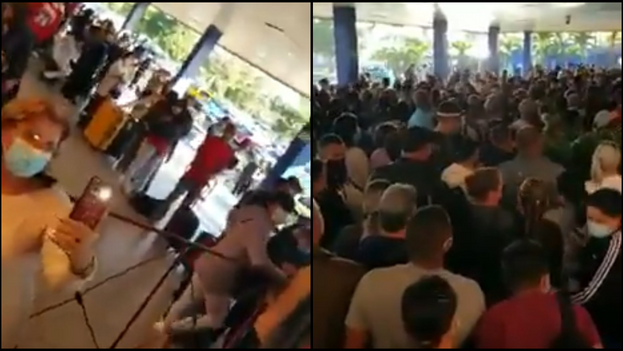
![]() 14ymedio, Havana, 6 January 2020 — Hundreds of travelers are stranded in Cuba after the Government’s January 1st decision to reduce flights to and from the United States and five other countries, to try to stop the rebound of Covid-19 on the island.
14ymedio, Havana, 6 January 2020 — Hundreds of travelers are stranded in Cuba after the Government’s January 1st decision to reduce flights to and from the United States and five other countries, to try to stop the rebound of Covid-19 on the island.
Hundreds of travelers arrived in the country in December and were scheduled to return in the first days of January, but their flights were canceled at Terminal 2 of the José Martí International Airport in Havana.
“My brother and I have been here for two full days, feeling cold and thirsty to see if we can leave,” Sayuri, a Cuban living in Texas who has not been able to leave Havana due to lack of flights, tells this newspaper.
“We signed up on a list and we have a number over 300 but we aren’t moving from here, although they told us that they would call us by phone, because there is a lot of corruption and people who pay are put ahead of others.” The emigrant says that climbing quickly in the list “costs between 150 and 200 dollars right now.” continue reading
A video that has gone viral on digital platforms shows the chaos that exists in Terminal 2 of the capital city’s airport, where desperate travelers crowd, without social distancing and without knowing what will happen to their return tickets. They have come to the airport with their luggage and are looking for answers.
The government’s announcement to reduce the entry of travelers brought with it a wave of cancellations of airlines flying to the island.
Terminal 2, which connects the Cuban capital with the United States, the Cayman Islands, the Bahamas and Germany, is not in a position to hold so many people, it is narrow and looks like a “container,” with few food options and bathrooms.
The other countries affected by the reduction in flights (Mexico, Panama, Haiti, Bahamas and the Dominican Republic) also serve as stopovers for travelers passing through a third country to avoid US sanctions.
The Cuban government asserted that international travelers’ contacts with other people represent “71.5% of the total cases detected in recent weeks, the vast majority associated with Cuban citizens” from the countries that were restricted.
From January 10, the health authorities will require a negative PCR test for covid-19 from all international travelers. The requirement includes that the test be carried out in a certified laboratory in the country of origin and carried out within a period of 72 hours before arrival in Cuba.
The official number of daily infections of Covid-19 on the island has remained at more than 160 for six days. This Wednesday the Ministry of Health reported 201 new cases, of which 123 were contacts of confirmed cases, 65 arrived infected from abroad and 13 without a specified source of infection.
Since the pandemic began last March, the country has confirmed 13,165 people with Coronavirus and 148 have died from the disease (in a population of just over 11 million). Currently, all provinces are infected and 1,746 patients remain as active cases.
El régimen cubano ordenó reducir vuelos de diferentes destinos. Varias aerolíneas cancelaron boletos y han dejado varados a muchos cubanos emigrados que fueron a pasar las fiestas navideñas con sus familiares. Así está el aeropuerto de La Habana hoy 👇🏿 pic.twitter.com/Jq4CXoCzEd
— Norges Rodríguez (@norges14) January 5, 2021
____________
COLLABORATE WITH OUR WORK: The 14ymedio team is committed to practicing serious journalism that reflects Cuba’s reality in all its depth. Thank you for joining us on this long journey. We invite you to continue supporting us by becoming a member of 14ymedio now. Together we can continue transforming journalism in Cuba.
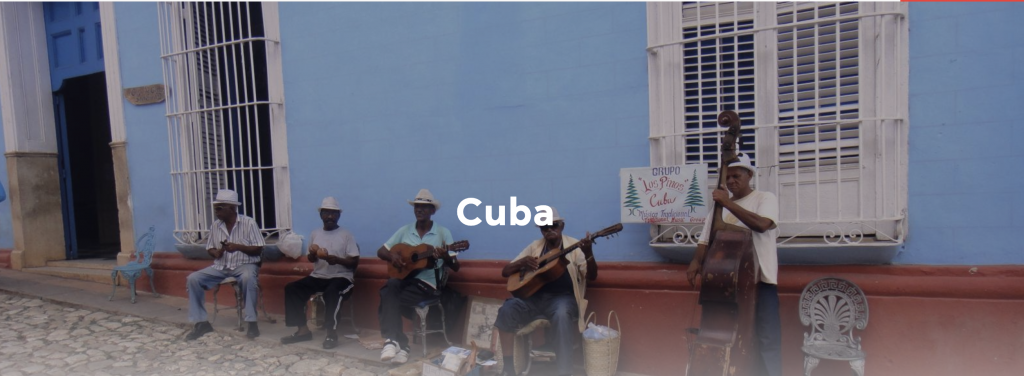
Reporters Without Borders, December 2020 — A self-styled socialist republic and one-party state, Cuba has continued year after year to be Latin America’s worst media freedom violator. Miguel Díaz-Canel’s election as president in April 2018, after 59 years of repression under the Castro family, has made no difference. The regime maintains an almost total media monopoly and the constitution prohibits privately-owned media.
The few Cuban bloggers and independent journalists are threatened by the government and watched by security agents, who often take them in for questioning and delete information in their devices. Journalists regarded as especially troublesome are often arrested and jailed.
The authorities also control the coverage of foreign reporters by granting accreditation selectively and expelling those regarded as too “negative” about the government. The gradual improvement in Internet access nonetheless constitutes grounds for hope about the future of press freedom in Cuba.